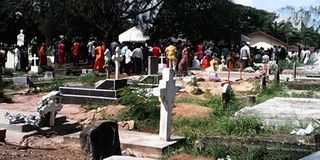Prime
Echoes of resilience: Untold stories of grave diggers in Dar es Salaam

What you need to know:
- In a town teeming with life, the grave diggers labour in the shadows, their efforts often overshadowed by societal stigma and misconceptions.
- Despite their decent purpose, to provide a dignified resting place for the departed, they find themselves cast as outsiders, feared and misunderstood by those they serve.
In the heart of Dar es Salaam, amid the bustling streets and busy life, lies a community often overlooked, yet important to the city's fabric – the grave diggers.
Theirs is a world winding in soberness, where the echoes of grief and the whispers of final farewells linger amidst the earthy scent of freshly dug graves.
With each move thrust into the ground, they bear witness to the passage of time and the fragility of human existence.
However, for these unsung heroes, the work of preparing final resting places is both a duty and a burden as they navigate the delicate balance between respect and practicality, ensuring that the departed find comfort in their eternal rest.
Yet behind the serious appearance, there are many untold stories about being strong when things are hard, finding friendship even when you're alone, and keeping your dignity even when people judge you.
In a town teeming with life, the grave diggers labour in the shadows, their efforts often overshadowed by societal stigma and misconceptions. Despite their decent purpose, to provide a dignified resting place for the departed, they find themselves cast as outsiders, feared and misunderstood by those they serve.
The weight of societal disrespect and judgement bears heavily upon their shoulders, yet they persevere, driven by a sense of duty and the knowledge that their work is a vital service to the community.
However, this job costs a minimum of Sh50,000 per grave whereas the income generated is divided among those involved in the digging, with it being clear that diggers in many cases are usually two to six.
Rashidi Mzinza, 38, one of the grave diggers in Sinza, Dar es Salaam revealed that it is a tough job, without a doubt.
He began that job in 2009 after being introduced to the trade by his late uncle, after arriving in Dar es Salaam from Kigoma region.
He shares that when he started that job, he couldn't sleep at night and even when he slept, he would dream about how the work was being done during the day.
“It took me six years to completely get used to this job and then I started to see everything as normal,” he said.
He shares that the job has made some people fear him and suspect him of involvement in occult practices, despite the reality that the job is for preparing areas to lay our loved ones to rest after they've passed away.
“Some people don't even want to be near me because of my job. Others tell me without fear that I should stay away from their families," he said.
He added: "In the past, it used to bother me, but these days I'm used to it because it's part of my work life. The reality of this job is that it's hard, but it also doesn't earn you respect, it only brings disdain in the community. They see us as losers despite the hard work we do."
He went on to say one particular challenge that weighs heavy on his conscience is when he is assigned to dig a grave where someone was already buried a few years ago.
“This task is often given by the street chairpersons, and although I could try and refuse to take on the task, there is simply no way out. We do that for sure, but it’s not something we like to do,” he said.
He shares that this situation has been fuelled by the limited space for graves in this bustling town. As the population continues to grow, finding suitable resting places for the deceased becomes increasingly difficult.
“The graveyards are not spacious enough to accommodate the significant number of burials that take place every day in this town, even the blind can see that,” he shared.
He explained that digging a grave where another person is already laid to rest is also emotionally challenging.
“I can't help but feel guilty, as I disturb the final resting place of someone who was once loved and cherished by their family and friends. It's disheartening to think that this is the only solution we now have due to the lack of available spaces,” he noted.
He continued: “We, the grave diggers, often find solace in knowing that we are providing a necessary service to the community. After all, everyone deserves a dignified place to rest eternally. But the fact remains that our hands are tied, and we have no option but to fulfil these difficult requests."
Similar to Mr Rashid, Mr Kelvin Habari, 34, famously known as ‘Tyson’ a resident of Kinondoni and one of the famous grave diggers in the area, picked the challenge of being assigned to dig graves where other people were buried as a prime one.
“We are going through a lot, but that one is never a normal thing for us,” he revealed.
He continued: “It is disheartening for me to dig up a grave where someone's loved one was laid to rest, as I understand the emotional impact it has on the families of the deceased."
“What if the deceased grandchildren want to see their grave in the future? Every time we do that task, I feel bad and guilty, and I have the feeling that one day, my own grave will be taken and my future grandchildren will never get the chance not only to see me, even to see my grave,” he added.
However, he said despite the difficult nature of his job, he has no choice but to carry out these assignments.
“Although it is painful for me to disturb resting places, there are simply no other viable alternatives. I think it is essential to acknowledge that the lack of adequate burial spaces is not something that any individual can control; it is a collective issue that stems from the limited availability of land in densely populated areas like Dar es Salaam,” he said.
Mr Habari has four years since he joined the field in 2019. He said that it took him only eight months to adapt to his working environment.
“I used to fear graves a few years back, but now I can even fall asleep in graves for hours. It feels like my office. We eat, we laugh, we tell each other stories and even discuss different things about our lives at the grave yards,” he shares.
He said that his job however, has been a cause of damage to his reputation in the streets.
For instance, he revealed that two years back when he wanted to move to the new house from where he was renting, he received a call from the landlord notifying him that he [landlord], could not live with a grave digger.
He sadly admitted: “That’s a thing I'll never forget in my life. Being discriminated against just because of my job (which is also a community service) made me feel worthless, to be honest.”
He added: “This job gives me my daily bread that’s what I care about the most regardless of some people treating us like ghosts in the streets.”

On the other hand, Father Leons Maziku, a psychologist and a lecturer at Saint Augustine University of Tanzania (SAUT), revealed that psychologically, these grave diggers may experience feelings of guilt, shame, and worthlessness as a result of their jobs and societal attitudes towards their work.
“The act of disturbing existing graves can evoke a profound sense of remorse and moral conflict, leading to feelings of inadequacy and self-doubt,” he shared.
Moreover, he said the social ostracism and discrimination faced by grave diggers may contribute to feelings of isolation, low self-esteem, and psychological distress.
“To address these psychological challenges, it is crucial to implement holistic support mechanisms for grave diggers. This includes providing access to mental health resources such as counselling, to help them cope with the emotional toll of their work,” he suggested.
Furthermore, Father Maziku shared that creating a supportive work environment where grave diggers feel valued and respected for their contributions is essential to fostering a sense of belonging and psychological well-being.
“Getting used to something abnormal is not normal for any human being, most people in these types of jobs are seeing their challenges as normal life challenges, but in reality, they are deeply affected without fully understanding it,” he said.



